Week of Innovative Regions in Europe - Speakers
30 October 2024
Modified: 13 May 2025
Reading time: 36 minute(s)
| About | Registration | Program | Speakers | Getting here | Livestream | Photos/videos | Documents |
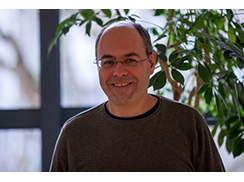 Day 2, 2024.11.14., 13-13:45 Breakout session 1: Policymaking at the national, regional and European level
Day 2, 2024.11.14., 13-13:45 Breakout session 1: Policymaking at the national, regional and European levelSvetlozar Andreev has been working for the European Committee of the Regions since 2008. He is head of the Research and Innovation policy sector. He has a PhD from the European University Institute (Florence, IT) in comparative political science. He used to be a visiting lecturer at New York University (US), the University of Sienna (IT), the University of Westminster (UK), Sofia University (BG) and many others. He was also a research fellow at St. Anthony's College, Oxford (UK) and at CEPC, Madrid (ES). He has more than 30 refereed publications in international scientific journals and collective volumes.
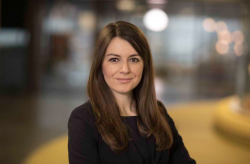 Day 1, 2024.11.13., 15:30-16:15. Plenary Session: Success stories from winning projects
Day 1, 2024.11.13., 15:30-16:15. Plenary Session: Success stories from winning projectsNtorina Antoni is a Postdoctoral Researcher at the Innovation, Technology Entrepreneurship & Marketing (ITEM) group at Eindhoven University of Technology, specializing in innovation ecosystems. Her work centers on strategic decision-making, stakeholder management, and strategy innovation within large high-tech organizations. Notably, her Ph.D. thesis focused on Managing Strategy Innovation: Co-Navigating the Strategy Perimeter in New Strategic Initiatives at the European Space Agency. Currently, she coordinates the COOPERATE project, which advances regional best practices in innovation ecosystems across Europe, fostering interregional knowledge sharing and learning. Ntorina’s academic credentials include a Law degree from the National and Kapodistrian University of Athens, an LL.M. in International and European Law (cum laude) from Tilburg University, and an Advanced LL.M. in Air and Space Law (with distinction) from Leiden University. Before academia, she gained significant industry experience in law, policy, and strategy, particularly in the aerospace sector. Notably, she served as a strategy and policy analyst at the European Space Agency in Paris, contributing to regulatory and strategic analysis. She also worked as legal counsel for Swiss Space Systems, overseeing the legal framework for aviation and aerospace projects, including satellite launches and parabolic flight certifications.
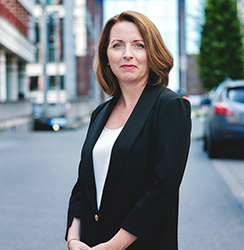 Day 2, 2024.11.14., 14:00-15:00 Closing Panel discussion: What are the directions FP10 should take towards regions? How can synergies be enhanced between Framework Programs and structural funds?
Day 2, 2024.11.14., 14:00-15:00 Closing Panel discussion: What are the directions FP10 should take towards regions? How can synergies be enhanced between Framework Programs and structural funds?Muriel Attané is a EU Public Affairs professional with a strong track record in strategic programming of EU policies helping research organisations to develop successful European strategy, as well as support them in setting-up and running powerful and efficient EU representation and network. Her 22-years career includes EU Public Affairs’ management roles in a large research organization such as TNO in the Netherlands where she led and expanded EU RD&I fundraising (subsidies & B2B) across various and EU funding programmes. She thrives in leading large European and International Networks of Research Organisations such as EARTO today (350+ corporate members over 30+ countries) in ever-changing political and economic environments with the help of very effective, multi-cultural & multi-background teams. Muriel’s mission is to render European Affairs accessible to the non-initiated and professionalise the running of EU networks by sharing her significant experience in EU public relations, public affairs and communications, business/legal advising in setting up non-profit Brussels-based associations. To this end, she launched in 2021 and is the CEO of EUROPESYNC a professional EU Public Affairs Boutique Consulting Firm based in Brussels.
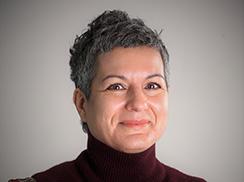 Day 1, 2024.11.13., 11:15-12:00 Panel discussion: Regional innovation through innovation ecosystems. Tools for boosting competitiveness of the regions
Day 1, 2024.11.13., 11:15-12:00 Panel discussion: Regional innovation through innovation ecosystems. Tools for boosting competitiveness of the regionsDay 2, 2024.11.14., 11:00-12:00 Panel discussion: A promising start? Assessing the first steps in the Regional Innovation Valley concept
Margherita Bacigalupo serves as Deputy Head of Unit for Innovation Policies and Economic Impact at the European Commission's Joint Research Centre in Seville, Spain. She leads the Transforming Territories project, driving JRC initiatives that integrate place-based innovation policies into local, national, and European efforts for sustainability. Her work is instrumental in executing the new the Preparatory Action for Innovation for place-based transformation that all territories from EU Member States and HE Associated Countries are invited to join. Prior to her current post, she held the position of Scientific Officer, where she has been a driving force behind the establishment of entrepreneurship as a key competence within lifelong learning, which resulted in the publication of the European Entrepreneurship Competence Framework (EntreComp). Her efforts have been recognized internationally, including an honorary fellowship with the Institute of Enterprise and Entrepreneurs (IOEE).
Day 2, 2024.11.14., 11:00-12:00 Panel discussion: A promising start? Assessing the first steps in the Regional Innovation Valley concept
Day 2, 2024.11.14., 14:00-15:00 Panel discussion: What are the directions FP10 should take towards regions? How can synergies be enhanced between Framework Programs and structural funds?
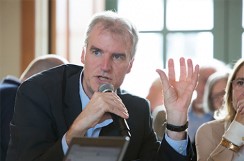 Day 1, 2024.11.13., 10:45-11:15, Keynote: Regional development traps in Europe, and how to overcome them
Day 1, 2024.11.13., 10:45-11:15, Keynote: Regional development traps in Europe, and how to overcome them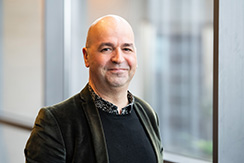 Day 1, 2024.11.13., 13:00-14:00, Parallel session: New challenges, new dimensions of regional disparities?
Day 1, 2024.11.13., 13:00-14:00, Parallel session: New challenges, new dimensions of regional disparities?Prof. Dr. Igor Calzada, MBA, FeRSA, is a Full Professor in Social Sciences and Humanities and Established Researcher (R3) (www.igorcalzada.com/publications). He works as Principal Investigator in Ikerbasque (Basque Foundation for Science) at the University of the Basque Country, Public Policy & Economic History Department (Spain) as well as at Cardiff University/WISERD (UK), being since 2022 Fulbright Scholar in California (USA) collaborating as Fellow with Decentralization Research Centre (Canada). He is Invited Professor at Warsaw School of Economics SGH (Poland) and Budapest University of Technology and Economics (Hungary). From 2012–2022, he has been Senior Scientist at the University of Oxford, European Commission DG Joint Research Centre, UN-Habitat, and has held academic positions in 14 universities worldwide (particularly, UK, USA, and Spain). From 2002–2011, he worked at Mondragon Cooperatives and held a Director of Innovation & Technology position in the Basque Government (Spain). His research currently revolves around how decentralization as a paradigm shift can change the course of data-opolies and AI through emerging Web3 Decentralized Technologies including case studies in different fields around Blockchain, DAOs, and Data Co-operatives. Google Scholar: 4521 citations, h-index 31, and i10-index 65. He was nominated as Apolitical’s 100 Most Influential Academic in Government
Ewa Chomicz- Policy and Engagement Manager, European Regions Research and Innovation Network (ERRIN)
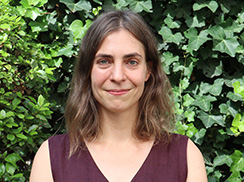 Day 2, 2024.11.14., 11:00-12:00, Panel discussion: A promising start? Assessing the first steps in the Regional Innovation Valley concept
Day 2, 2024.11.14., 11:00-12:00, Panel discussion: A promising start? Assessing the first steps in the Regional Innovation Valley conceptEwa Chomicz is a Policy and Engagement Manager at ERRIN - European Regions Research and Innovation Network. EERRIN is an established Brussels-based network that gathers close to 120 regional organisations from over 20 European countries. Created in 2001, ERRIN supports members to enhance their regional and local research and innovation capacities and further develop their R&I ecosystems. Ewa is passionate about transformative innovation policies to deliver impact on the ground, and has almost 10 years of experience in the field of interregional cooperation and EU policy research.
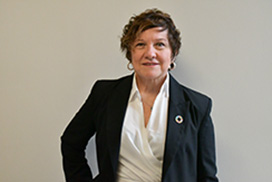 Day 2, 2024.11.14., 11:00-12:00, Panel discussion: A promising start? Assessing the first steps in the Regional Innovation Valley concept
Day 2, 2024.11.14., 11:00-12:00, Panel discussion: A promising start? Assessing the first steps in the Regional Innovation Valley conceptPhD in Molecular Biology, MSc Science Communication, MA Diplomacy and Foreign Affairs
Director of Strategic Foresight and International Relations at Biocat. President of the Council of European BioRegions (CEBR). Member of the Board of Directors of the European Clusters Alliance (ECA). Member of the Joint Industrial Cooperation Forum of the Health Emergency and Preparedness Agency (HERA). EIT Health Innostars clusters mentor.
Member of the Expert Committee for AI/Health Program (Government of Catalonia). Member of the Expert Committee for the National Agreement for health System Transformation (Government of Catalonia)
Coordinator of PRECISEU, the Regional Innovation Valley flagship on Personalised Medicine.
Former Research scientist (Life Sciences, 1987-1999), R&I Adviser, Government of Catalonia (Ministry of Research and Universities, 2011-2022), National Expert Horizon Europe, Cluster Health Program Committee.
Interests: Innovation Ecosystems, Impact, Sustainable and Digital Transformation, EU policies, Internationalisation, Gender, Healthcare.
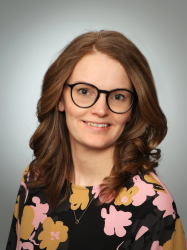 Day 2, 2024.11.14., 13:00-14:00, Parallel session: Policymaking on the national, regional and European level
Day 2, 2024.11.14., 13:00-14:00, Parallel session: Policymaking on the national, regional and European level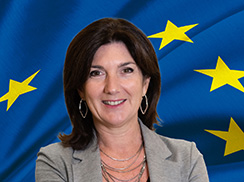 Day 1, 2024.11.13., 11:15-12:00 Panel discussion: regional innovation through innovation ecosystems, tools for boosting competitiveness of the regions
Day 1, 2024.11.13., 11:15-12:00 Panel discussion: regional innovation through innovation ecosystems, tools for boosting competitiveness of the regionsDay 1, 2024.11.13 13:00-14:00 Parallel session: Developing and consolidating synergies between cohesion-policy programs and Horizon Europe
Day 2, 2024.11.14., 9:15-10:30 Plenary Session: Dynamics of innovation gaps – role of regions in fostering innovation
Day 2, 2024.11.14., 15:00-15:20 Wrap-up of Conference
Magda DE CARLI is Head of the Unit ‘European Semester & Country Intelligence’ and Deputy Director in DG R&I – European Commission, responsible for supporting Member States to design and implement an R&I joint agenda and maximise their R&I investments and reforms. In this context, the unit is charge of fostering the R&I dimension of the Recovery and Resilience Facility, promote synergies with Cohesion funds, support Member States through the Policy Support Facility and regions through the biannual WIRE conference for a better performance of national & regional R&I systems. Earlier she headed the units in charge of ERA, Widening and SME Policy. She has a MScEcon and over 26years experience in R&I.
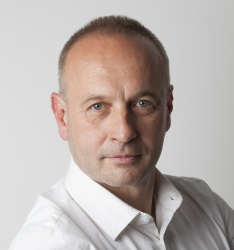 Day 1, 2024.11.13. 14:25-15:00 Panel discussion: Stakeholders’ reflections and experiences
Day 1, 2024.11.13. 14:25-15:00 Panel discussion: Stakeholders’ reflections and experiencesDr. Csaba Deák is a professor of University of Miskolc. Between 2012-2014 he was is the deputy chairman of National Innovation Office of Hungary. He was the Chancellor of University of Miskolc between 2014-2020. He is guest lecturer at Universitatea Babes-Bolyai, Romania and graduate faculty member at Florida Agricultural and Mechanical University. His research interests are in innovation management, project management, innovation systems, change and strategic management. He is also founder and honorary chairman of North Hungarian ICT Cluster. He is also worked as management consultant for several Hungarian and transnational companies like Robert Bosch, Coca-Cola Hungary, Red Bull Hungary, Raiffeisen Bank etc. His main fields of research & training are: innovation management, project management, change management and the relation between innovation and sustinability. In 2001, he attained a doctorate (PhD) concerning change management and reengineering projects in practice, and in 2010 he attained an academic habilitation concerning innovation management and project management. Csaba Deák is fellow of ISPIM (International Society for Professional Innovation Management). Since 2010 Csaba Deák is a Honorary Consul of Finland in Hungary.
Day 1, 2024.11.13., 15:30-16:15. Plenary Session: Success stories from winning projects
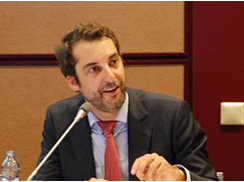 Day 2, 2024.11.14., 9:15-10:30 Plenary Session: Dynamics of innovation gaps and role of regions in fostering innovation
Day 2, 2024.11.14., 9:15-10:30 Plenary Session: Dynamics of innovation gaps and role of regions in fostering innovationMathieu Doussineau is a policy analyst and researcher currently working for the European Future Innovation System (EFIS) Centre. His work focuses on governance mechanisms, policy evaluation, and the use of data for governance and evidence-based policy. Prior to his role EFIS Centre, Mathieu worked at the European Commission's Joint Research Centre (JRC) in Seville, where he was involved in the implementation of smart specialisation strategies (S3) and the development of synergies between funding across EU regions. Mathieu's research
interests include data and innovation ecosystems, Artificial Intelligence for innovation policy governance and the impact of research and innovation policies on societal challenges.
Mathieu is an engineer by training and holds a PhD in applied economics.
interests include data and innovation ecosystems, Artificial Intelligence for innovation policy governance and the impact of research and innovation policies on societal challenges.
Mathieu is an engineer by training and holds a PhD in applied economics.
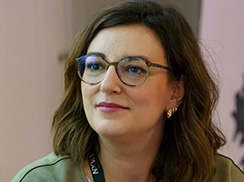 Day 1, 2024.11.13., 13:00-14:00 Parallel session: New challenges, new dimensions of regional disparities?
Day 1, 2024.11.13., 13:00-14:00 Parallel session: New challenges, new dimensions of regional disparities?Silvia Gómez Recio is the first Secretary General of YERUN - Young European Research Universities Network - since October 2016, when the network opened its Brussels office. She leads YERUN’s strategic direction, coordinates networking activities, and oversees the implementation of the network's strategy and objectives. YERUN has set up various working groups among its members to facilitate the exchange of best practices on topics essential to young research universities. These include EU policy, career development, research collaboration, open science, lifelong learning, and sustainable development goals. YERUN is a network of young, research universities in Europe that promotes cooperation in research, education, and societal engagement to foster meaningful contributions across Europe. Before joining YERUN, Silvia Gomez Recio served as the representative of Coventry University in Brussels and worked as an EU Policy Adviser at the European Federation of Nurses.
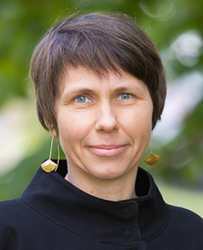 Day 1, 2024.11.13., 13:00-14:00 Parallel session: Developing and consolidating synergies between cohesion-policy programs and Horizon Europe
Day 1, 2024.11.13., 13:00-14:00 Parallel session: Developing and consolidating synergies between cohesion-policy programs and Horizon EuropeTáňa Hálová Perglová is currently Section Director at Technology Agency of the Czech Republic - the main funding organisation of applied research in the Czech Republic.
She has gained professional experience in research and innovation policy, investments and business development, EU funding and in the implementation of EU structural funds in different positions in the Technology Agency of the Czech Republic, CzechInvest, CZELO (Czech Liaison Office for Research and Development in Brussels), Ministry of Education, Youth and Sports, CZ PRES in the Council of the EU and in the private sector. She has been actively involved in international cooperation and synergies with Horizon 2020/Horizon Europe.
Táňa is the Czech delegate to the EIC/EIE programme committee of Horizon Europe, the high level representative of the Czech Republic to EUREKA and co-chair of ERA Forum sub-group on Access to Excellence - R&I and Cohesion Managing Authorities Network (RIMA).
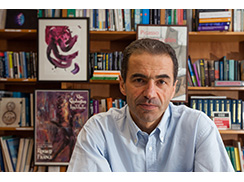 Day 2, 2024.11.14., 14:00-15:00 Closing Panel discussion: What are the directions FP10 should take towards regions? How can synergies be enhanced between Framework Programs and structural funds?
Day 2, 2024.11.14., 14:00-15:00 Closing Panel discussion: What are the directions FP10 should take towards regions? How can synergies be enhanced between Framework Programs and structural funds?Manuel Heitor is a professor at Instituto Superior Técnico (IST) the engineering school at the University of Lisbon. He served as Minister for Science, Technology and Higher Education for the Government of Portugal in 2015-2022 and as Secretary of State from 2005 to 2011. Overall he served near 13 years in the Portuguese Government. In 2023 he was appointed by the European Commission to chair the Expert group for the interim evaluation of the Horizon Europe programme and to guide the evolution of the European Research and Innovation (R&I) Framework programme.
Manuel Heitor served as the deputy-president of IST from 1993-1998. Since 1995, he has been a research fellow at the University of Texas at Austin’s IC2 Institute. He was a founding member of the S&T Council of the International Risk Governance Council, IRGC and of Globelics: the Global Network for the Economics of Learning, Innovation, and Competence-building Systems. He founded in 1998 the IST´s Center for Innovation, Technology and Policy Research, IN+, and coordinated the IST´s doctoral programs in “Engineering and Public Policy" and in “Engineering Design and Advanced Manufacturing”. He was a visiting scholar at Harvard University in 2011/12 and in 2023 and a visiting professor at New York University in 2022/23.
Manuel Heitor holds a Ph.D. from Imperial College London in combustion research (1985) and did post-doctoral training at the University of California, San Diego. He has published over 130 scientific articles and supervised over 40 post-grad students. He has authored 5 books and co-edited more than 20 books through international publishers.
In 2022 he received the Honorary Doctor in Science and Technology from Carnegie Mellon University and was nominated “IST distinguished Professor”. He is a Honorary Member of the European Academy of Cancer Sciences, a Corresponding Member of the Royal Academy of Engineering, Spain, and a Foreign Member of Serbian Academy of Engineering.
Day 2, 2024.11.14, 9:15-10:30 Plenary Session: Dynamics of innovation gaps and the role of regions in fostering innovation
Day 1, 2024.11.13., 10:45-11:15 Panel discussion: Regional innovation through innovation ecosystems. Tools for boosting competitiveness of the regions
Day 2, 2024.11.14., 13:00-13:45 Parallel session: Policymaking on the national, regional and European level
Day 2, 2024.11.14., 13:00-13:45 Parallel session: Policymaking on the national, regional and European level
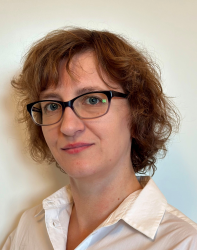 Day 2, 2024.11.14., 11:00-12:00 Panel discussion: A promising start. Assessing the first steps in the Regional Innovation Valley concept
Day 2, 2024.11.14., 11:00-12:00 Panel discussion: A promising start. Assessing the first steps in the Regional Innovation Valley concept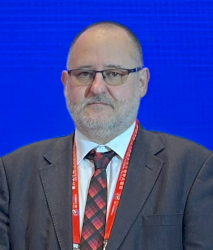 Day 1, 2024.11.13. 14:25-15:00 Panel discussion: Stakeholders’ reflections and experiences
Day 1, 2024.11.13. 14:25-15:00 Panel discussion: Stakeholders’ reflections and experiencesZoltán Kónya is a professor at University of Szeged since 2011. His research field is materials chemistry and environmental science. He is co-author of more than 500 research papers, and so far he received ~12000 citations (H-index 61). He is the head of the Department of Applied and Environmental Chemistry and the Environmental Science Doctoral School and since 2018 he is Vice-Rector for Scientific Affairs & Innovation at the University of Szeged. Prof. Kónya was awarded Pungor Ernő Medal of the Hungarian Academy of Sciences in 2015 and the Polanyi Medal of the Hungarian Academy of Sciences in 2004, George Hevesy Lectureship of German Chemical Society in 2017. Dr. Kónya received Gábor Dénes Award (the most prestigious innovation award in Hungary) for his work in the field of manufacture of nanomaterials/nanocomposites and their industrial application. In 2019 Prof. Kónya was decorated with the Hungarian Order of Merit Officer’s Cross Civil Section.
Day 1, 2024.11.13., 13:00-14:00 Parallel session: New challenges, new dimensions of regional disparities?
Day 2, 2024.11.14., 15:00-15:20 Wrap-up of Conference – take-away messages, lessons learned
Day 2, 2024.11.14, 9:15-10:30 Plenary Session: Dynamics of innovation gaps – role of regions in fostering innovation
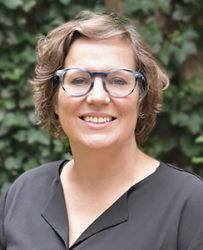 Day 1, 2024.11.13., 13:00-14:00 Parallel session: Developing and consolidating synergies between cohesion-policy programs and Horizon Europe
Day 1, 2024.11.13., 13:00-14:00 Parallel session: Developing and consolidating synergies between cohesion-policy programs and Horizon EuropeDay 2, 2024.11.14., 14:00-15:00, Closing Panel discussion: What are the directions FP10 should take towards regions? How can synergies be enhanced between Framework Programs and structural funds?
Pirita Lindholm is the Director of ERRIN - European Regions Research and Innovation Network. ERRIN is an established Brussels-based network that gathers close to 120 regional organisations from over 20 European countries. Created in 2001, ERRIN supports members to enhance their regional and local research and innovation capacities and further develop their R&I ecosystems. Pirita is an enthusiast of mission-oriented policy and served as a member of the Mission Assembly of the climate-neutral and smart cities mission between 2019-2021. She has over 20 years of experience working in European networks representing local and regional actors, especially in the areas of climate, energy and sustainability.
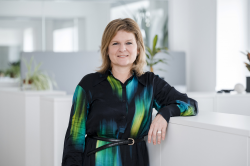 Day 1, 2024.11.13., 10:00-10:45 Opening Plenary
Day 1, 2024.11.13., 10:00-10:45 Opening PlenaryDay 1, 2024.11.13., 11:15-12:00 Panel discussion: Regional innovation through innovation ecosystems. Tools for boosting competitiveness of the regions
Day 1, 2024.11.13., 13:00-14:00 Parallel session: New challenges, new dimensions of regional disparities?
Day 1, 2024.11.13., 13:00-14:00 Parallel session: New challenges, new dimensions of regional disparities?
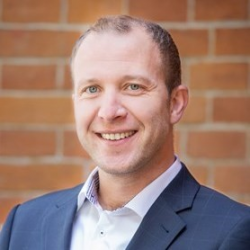 Day 1, 2024.11.13., 13:00-14:00 Parallel session: Developing and consolidating synergies between cohesion-policy programs and Horizon Europe
Day 1, 2024.11.13., 13:00-14:00 Parallel session: Developing and consolidating synergies between cohesion-policy programs and Horizon EuropeDay 2, 2024.11.14., 13:00-13:45 Parallel Session: Role of research and technology infrastructures in boosting regional innovation
Lukas Palko is the director of research office at Masaryk University (MU) and secretary of Research Universities Association of Czech republic. Lukas is an experienced research manager currently responsible for grant funding, research infrastructures, research evaluation, science communication and for doctoral studies of MU. Lukas is also active in the international networks – he chaired the Grants and Research Funding focus group of Alliance4Life for two years. In the past he was involved in research management in aerospace and clinical institutions.
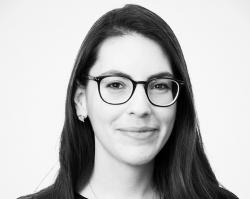 Day 1, 2024.11.13., 15:30-16:15. Plenary Session: Success stories from winning projects
Day 1, 2024.11.13., 15:30-16:15. Plenary Session: Success stories from winning projectsWith over a decade of international experience in Research & Innovation and the private sector, Marina is dedicated to bridging scientific expertise with business and policy networks to drive impact for environmental sustainability. She is currently the Managing Coordinator of the Climate and Atmosphere Research Centre of The Cyprus Institute, where she leads activities across innovation, science communications and grant writing and implementation. She is Coordinator of the €2.5M Horizon Europe project ‘ENVRINNOV’, building a joint strategy to enhance the innovation capacity of European Research Infrastructures in the environment domain, strengthen industry collaboration, and develop new technologies and services. She also leads exploitation and communications for several large EU consortia, including the €30M Horizon2020 Teaming-for-Excellence project ‘EMME-CARE’, which the European Commission applauded as a “communications champion”. Prior to joining The Cyprus Institute, Marina worked in London, as a strategy and communications consultant with companies in Europe, South-East Asia and the US (including Fortune 500), and in innovation and enterprise within Higher Education. She is a Chartered Marketer, and a certified coach with broad experience in providing professional development and business support to start-ups and early-career professionals.
Day 1, 2024.11.13., 15:30-16:15. Plenary Session: Success stories from winning projects
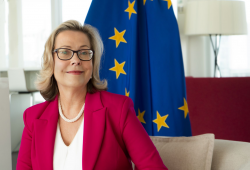 Day 1, 2024.11.13., 10:00-10:45, Opening Plenary
Day 1, 2024.11.13., 10:00-10:45, Opening Plenary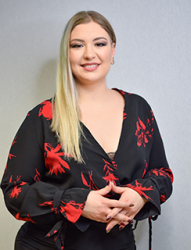 Day 1, 2024.11.13., 11:15-12:00 Panel discussion: regional innovation through innovation ecosystems, tools for boosting competitiveness of the regions
Day 1, 2024.11.13., 11:15-12:00 Panel discussion: regional innovation through innovation ecosystems, tools for boosting competitiveness of the regionsKamilla is a communication expert, an entrepreneur, and a researcher. All the fields in her life are connected by the startups and the innovation ecosystem. She is the co-founder of InnoMaker Partners, which provides strategic marketing for startups: market validation, market entry, and brand building. They offer highly personalized services for early-stage founders with mainly technical or strong industry backgrounds, acting as a trusted partner in their strategic marketing until they can manage it in-house. As a communication science PhD student, she is studying the internal communication of startups to help them formulate successful internal communication strategies based on their specific needs. And as a communication expert, she also brings her skills to life as both an event manager and a moderator, ensuring everything runs smoothly and engagingly.
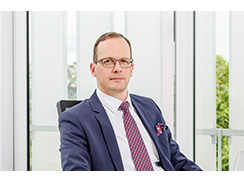 Day 2, 2024.11.14., 13:00-13:45 Parallel session: Role of research and technology infrastructures in boosting regional innovation
Day 2, 2024.11.14., 13:00-13:45 Parallel session: Role of research and technology infrastructures in boosting regional innovationIstván Szabó is the Deputy CEO for Strategy and Innovation at HUN-REN and holds a Ph.D. in Economics from the University of Miskolc, focusing on research infrastructures. He began his career at the National Innovation Office in 2011, where he established the RDI Observatory, and later managed strategic initiatives at the Ministry of Human Capacities. From 2018 to 2023, he served as Vice President at the NRDI Office, overseeing research grants and launching the "Excellent Research Infrastructures" program. He played a significant role in developing Hungary's RDI Strategy and Smart Specialization Strategy and shares his expertise as a lecturer in innovation policy, research infrastructures, and scientometrics at several Hungarian universities.
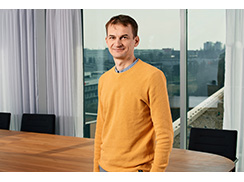 Day 2, 2024.11.14., 9:15-10:30 Plenary session: Dynamics of innovation gaps – role of regions in fostering innovation
Day 2, 2024.11.14., 9:15-10:30 Plenary session: Dynamics of innovation gaps – role of regions in fostering innovationDavid Uhlíř holds the post of Innovation Ecosystem Architect and Chief Strategy Officer (CSO) and at JIC (South Moravian Innovation Centre), located in Brno, Czech Republic. From his position he is involved in developing new strategic initiatives in South Moravia, typically involving multiple innovation actors: public sector, academia, businesses. David developed the first generation of RIS of South Moravia in 2002 and was also instrumental in establishing JIC in 2003.
Over the last 20+ years he worked at different positions in the field of regional policy and research and innovation policy (Czech Ministry of Regional Development, Regional Development Agency of South Moravia, and Czech Ministry of Education) and also spent four years as a seconded national expert at the European Commission, DG Research. He participated in a number of international assignments related to design of innovation and research policies for OECD and European Commission at the EU level and in several countries (Romania, Croatia, Slovakia)
His professional interests revolve around regional development theory and practice, science and technology and innovation policies.
Between 2013-2021 David represented Czech Business Innovation Centres in the Board of Director of European Business Innovation Centres Network (EBN), between 2019-2021 he acted as its President.
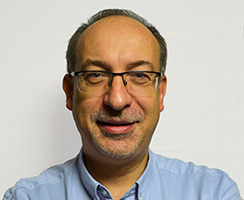 Day 1, 2024.11.13., 13:00-14:00, Parallel session: New challenges, new dimensions of regional disparities?
Day 1, 2024.11.13., 13:00-14:00, Parallel session: New challenges, new dimensions of regional disparities?Viktor Varjú, Senior research fellow at IRS/KRTK earned his PhD in Earth sciences. Viktor is dealing with environmental policy in Europe and Hungary, environmental policy integration into planning and development procedures, social and governmental aspects of circular economy and socio-geographical aspects of renewable energy use. His experiences include: 1) Research fellow in EUBORDERSCAPES (FP7); 2) participant member in ‘Governance for Sustainability’ (FP6), responsible for the elaboration and analysis of the Hungarian case; 3) participant member in ‘Ex-post Evaluation of the Cohesion Fund’ (incl. former ISPA) Work Package D: Management and Implementation, responsible for the Hungarian country report. In his former H2020 – REPAiR research project, leading the Hungarian team, Viktor is coordinating the Work Package on knowledge transfer. He led the Hungarian team in the ESPON LAKES (affiliated to Hétfa), investigating the governance of Balaton as a large lake. Currently, he leads the Hungarian team of the SSH CENTRE Horizon Europe project investigating the limited participation of SSH researchers in EU-funded projects and coordinating the Hungarian follower region and team in the P2GreeN HE project (dealing with circular transition in fertilization). In the latter project, he also coordinated a task on social acceptance and contributed to that task on governance analysis.
Day 1, 2024.11.14., 14:15-15:00 Plenary Session: Hungary’s practice for fostering regional innovation: Introduction to the TIP (Regional Innovation Platform) concept
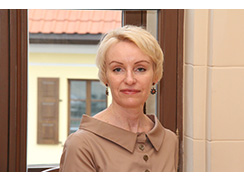 Day 1, 2024.11.13., 13:00-14:00 Parallel session: Developing and consolidating synergies between cohesion-policy programs and Horizon Europe
Day 1, 2024.11.13., 13:00-14:00 Parallel session: Developing and consolidating synergies between cohesion-policy programs and Horizon EuropeAistė Vilkanauskytė serves as an Advisor in the Technology and Innovation Division at the Ministry of Education, Science and Sport in Lithuania. With nearly 20 years of experience in the administration and funding of international and bilateral research and innovation programs, she has established herself as an expert in the field. Aistė Vilkanauskytė is an active member of several committees and organizations, including the European Research Area Committee (ERAC), the Horizon Europe Strategic Programme Committee, the COST Committee of Senior Officials, and the COST Executive Board. Additionally, she has been appointed as the Horizon Europe National Contact Point (NCP) coordinator in Lithuania. Throughout her career, Aistė Vilkanauskytė has played a significant role in the development and implementation of various research funding schemes, notably those designed to enhance Lithuanian participation in EU framework programmes for research and innovation. Aistė Vilkanauskytė holds both bachelor's and master's degrees in natural sciences, along with a PhD in biochemistry.
| About | Registration | Program | Speakers | Getting here | Livestream | Photos/videos | Documents |
Updated: 13 May 2025







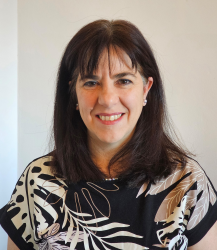 Dr. Ornela De Giacomo is Deputy Executive Director of CERIC-ERIC since 2015. She has 20 years of experience in Research Infrastructures, first as a user and later in operations and management. She spent a fruitful year working jointly for CERIC ERIC and EPOS ERIC, as a member of EPOS’ Executive Coordination Office, in the Management Unit. In 2015, she contributed to the initiative Foresight Science and Technology of the Italian National Research Council as part of the working group "Converging technologies for sustainable and healthy food". She also worked in technology transfer for a private company in the sector of polymers. Her background is in Food Engineering (2000), and she completed her Ph.D. in Nanotechnology in 2008. She was trained in Strategic Management of Research Infrastructures and Project management for engineers in Virginia, US, in 2018 and Team Leadership at the Bocconi university, Milan in 2023. She has taken part in RIs advisory boards such as the EPOS SP Advisory board (2018-2020), the Conseil Scientifique d'E-RIHS France (2019-2021) and currently E-RIHS IP Research Infrastructure Advisory Board (RIAB). She was member of the EOSC-A Task Force “Financial Sustainability of EOSC” (2022-2024).
Dr. Ornela De Giacomo is Deputy Executive Director of CERIC-ERIC since 2015. She has 20 years of experience in Research Infrastructures, first as a user and later in operations and management. She spent a fruitful year working jointly for CERIC ERIC and EPOS ERIC, as a member of EPOS’ Executive Coordination Office, in the Management Unit. In 2015, she contributed to the initiative Foresight Science and Technology of the Italian National Research Council as part of the working group "Converging technologies for sustainable and healthy food". She also worked in technology transfer for a private company in the sector of polymers. Her background is in Food Engineering (2000), and she completed her Ph.D. in Nanotechnology in 2008. She was trained in Strategic Management of Research Infrastructures and Project management for engineers in Virginia, US, in 2018 and Team Leadership at the Bocconi university, Milan in 2023. She has taken part in RIs advisory boards such as the EPOS SP Advisory board (2018-2020), the Conseil Scientifique d'E-RIHS France (2019-2021) and currently E-RIHS IP Research Infrastructure Advisory Board (RIAB). She was member of the EOSC-A Task Force “Financial Sustainability of EOSC” (2022-2024).